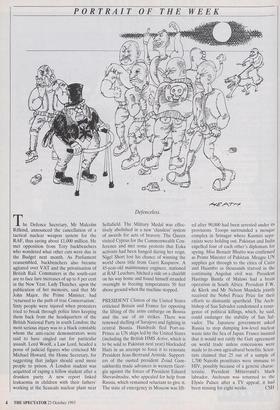PORTRAIT OF THE WEEK
Defenceless. The Defence Secretary, Mr Malcolm Rifkind, announced the cancellation of a tactical nuclear weapon system for the RAF, thus saving about £1,000 million. He met opposition from Tory backbenchers who wondered what other cuts were due in the Budget next month. As Parliament reassembled, backbenchers also became agitated over VAT and the privatisation of British Rail. Commuters in the south-east are to face fare increases of up to 8 per cent in the New Year. Lady Thatcher, upon the publication of her memoirs, said that Mr John Major, the Prime Minister, had `returned to the path of true Conservatism'. Sixty people were injured when protesters tried to break through police lines keeping them back from the headquarters of the British National Party in south London; the most serious injury was to a black constable whom the anti-racist demonstrators were said to have singled out for particular assault. Lord Woolf, a Law Lord, headed a posse of judicial figures who criticised Mr Michael Howard, the Home Secretary, for suggesting that judges should send more people to prison. A London student was acquitted of raping a fellow student after a drunken party. A new report linked leukaemia in children with their fathers' working at the Seascale nuclear plant near
Sellafield. The Military Medal was effec- tively abolished in a new 'classless' system of awards for acts of bravery. The Queen visited Cyprus for the Commonwealth Con- ference and met some protests that Eoka activists had been hanged during her reign. Nigel Short lost his chance of winning the world chess title from Garri Kasparov. A 45-year-old maintenance engineer, stationed at RAF Leuchars, hitched a ride on a chairlift on his way home and found himself stranded overnight in freezing temperatures 50 feet above ground when the machine stopped.
PRESIDENT Clinton of the United States criticised Britain and France for opposing the lifting of the arms embargo on Bosnia and the use of air strikes. There was renewed shelling of Sarajevo and fighting in central Bosnia. Hundreds fled Port-au- Prince as UN ships led by the United States (including the British HMS Active, which is to be sold to Pakistan next year) blockaded Haiti in an attempt to force it to reinstate President Jean-Bertrand Aristide. Support- ers of the ousted president Zviad Gam- sakhurdia made advances in western Geor- gia against the forces of President Eduard Shevardnadze, who appealed for help from Russia, which remained reluctant to give it. The state of emergency in Moscow was lift-
ed after 90,000 had been arrested under its provisions. Troops surrounded a mosque complex in Srinagar where Kasmiri sepa- ratists were holding out. Pakistan and India expelled four of each other's diplomats for spying. Miss Benazir Bhutto was confirmed as Prime Minister of Pakistan. Meagre UN supplies got through to the cities of Cuito and Huambo as thousands starved in the continuing Angolan civil war. President Hastings Banda of Malawi had a brain operation in South Africa. President F.W. de Klerk and Mr Nelson Mandela jointly received the Nobel Peace Prize for their efforts to dismantle apartheid. The Arch- bishop of San Salvador condemned a resur- gence of political killings, which, he said, could endanger the stability of San Sal- vador. The Japanese government asked Russia to stop dumping low-level nuclear waste into the Sea of Japan. France insisted that it would not ratify the Gatt agreement on world trade unless concessions were made to its own agricultural benefits. Scien- tists claimed that 25 out of a sample of 1,700 Nairobi prostitutes were immune to HIV, possibly because of a genetic charac- teristic. President Mitterrand's black labrador, Atchoum was returned to the Elysee Palace after a TV appeal; it had been missing for eight weeks. CSH


































































 Previous page
Previous page